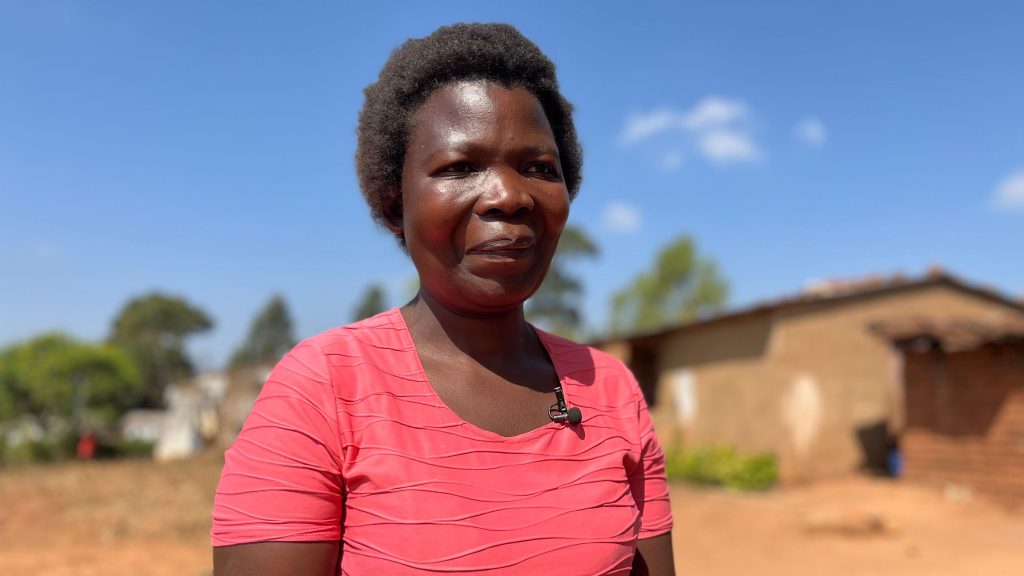From Diagnosis to Recovery: Dorothy Masasa’s Journey with Cervical Cancer
3 min read
Dorothy Masasa is one of the thousands of women diagnosed with cervical cancer every year in Malawi

Dorothy Masasa is one of the thousands of women diagnosed with cervical cancer every year in Malawi
Dorothy Masasa, a 39-year-old mother from Thyolo district in southern Malawi, strolls down a dirt road with her baby securely strapped to her back. Just six months ago, her life was drastically altered when she was diagnosed with cervical cancer while 13 weeks pregnant. This diagnosis came as a shock, but today she embraces her newfound strength and resilience.
Initially, Masasa experienced troubling symptoms, including abdominal cramping, persistent bleeding, and a foul-smelling vaginal discharge. Doctors initially suspected a sexually transmitted infection, but after further examination, the diagnosis of cervical cancer was made. She was quickly registered as an emergency case, as her doctors explained that her pregnancy and cancer diagnosis posed significant challenges.
Faced with two difficult choices, Masasa had to choose between an operation that would terminate her pregnancy or chemotherapy, which posed risks to her unborn child. Ultimately, she opted for chemotherapy until the baby was safely delivered via Caesarean section, thankfully without any disabilities. During this operation, her uterus was also removed to eliminate the cancer.
After her diagnosis and treatment in Malawi, Masasa required additional care that was unavailable in her home country until recently. She became part of a group of 30 women airlifted to a Nairobi hospital in Kenya by the aid organization Médecins Sans Frontières (MSF) for life-saving radiotherapy. This was a significant milestone for her, marking her first time on a plane and a difficult decision to leave her newborn baby behind. However, she found the strength to go, motivated by the hope of returning home healthy.
When the BBC visited Masasa during her treatment, she appeared frail, having lost weight and hair due to the rigorous procedures. She is one of 77 patients airlifted from Malawi to Kenya for cervical cancer treatment since 2022. For decades, Malawi lacked the necessary medical infrastructure to provide such critical care, but earlier this year, it installed its first radiotherapy machine at the International Blantyre Cancer Centre, a significant advancement in the country’s healthcare system.
Additional machines are expected to be operational soon at the National Cancer Centre, currently under construction in Lilongwe. Although Malawi is making strides, the nation still faces numerous challenges in providing comprehensive cancer treatment. Many countries in sub-Saharan Africa lack access to radiotherapy, leaving patients to endure costly and exhausting journeys abroad for treatment.
Cervical cancer is a pressing health issue, being the fourth most common cancer among women globally, with approximately 660,000 new cases and 350,000 deaths reported in 2022 by the World Health Organization (WHO). Alarmingly, many of the countries with the highest rates of cervical cancer are in Africa, primarily due to inadequate access to preventative care, including the human papillomavirus (HPV) vaccine and screening.
Dr. Samuel Meja, an obstetrician and gynecologist at Malawi’s Queen Elizabeth Central Hospital, emphasizes the severity of cervical cancer in the region. He notes that poor access to screening and the ongoing HIV epidemic have exacerbated the situation. In 2018, Malawi had one of the highest cervical cancer rates in southern Africa.
In response to these grim statistics, health campaigns aimed at vaccinating young girls against HPV have gained momentum across Africa. For instance, Lesotho achieved an impressive 93% vaccination coverage among 139,000 girls. However, cultural stigma surrounding gynecological health issues remains a barrier, affecting vaccination rates in countries like Zambia and Malawi.
Despite these challenges, Dr. Meja highlights the introduction of cervical cancer screening in Malawi, a crucial step in identifying and treating women at risk before they develop cancer. “This investment is what we need to make as a nation before it gets out of hand,” he asserts.
Today, Masasa is back home in Malawi, rejuvenated by the treatment she received in Kenya. Her health has improved significantly; her hair has grown back, and she is once again active in her daily life—tending to her cow and working in the fields. Most importantly, she has become an advocate for cervical cancer awareness and prevention.
Masasa is determined to ensure that her daughter receives the HPV vaccine, stating, “Cervical cancer took me through a hard phase, and I wouldn’t want my daughter to go through the same.” Her journey has transformed her perspective on health, and she now spreads hope to others facing similar battles. “There is a huge difference between how I was then and how I am now. I feel so happy that I am healed.”